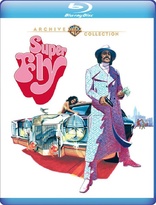Super Fly Blu-ray Movie
HomeSuper Fly Blu-ray Movie 
Warner Bros. | 1972 | 91 min | Rated R | Jun 26, 2018Movie rating
6.8 | / 10 |
Blu-ray rating
| Users | 4.5 | |
| Reviewer | 4.0 | |
| Overall | 4.0 |
Overview
Super Fly (1972)
Big, bad Youngblood Priest is a cocaine dealer who realizes the thug life isn't for him and puts together one last deal that will net him enough money so he can start over. But he knows his "colleagues" won't quite agree with his escape plan, so he must find a way to save his soul and come out of the mayhem alive.
Starring: Ron O'Neal, Carl Lee, Sheila Frazier, Julius Harris, Charles McGregorDirector: Gordon Parks, Jr.
| Crime | Uncertain |
| Drama | Uncertain |
| Action | Uncertain |
Specifications
Video
Video codec: MPEG-4 AVC
Video resolution: 1080p
Aspect ratio: 1.78:1
Original aspect ratio: 1.85:1
Audio
English: DTS-HD Master Audio 2.0 Mono (48kHz, 24-bit)
Subtitles
English SDH
Discs
Blu-ray Disc
Single disc (1 BD)
Playback
Region A, B (C untested)
Review
Rating summary
| Movie | 4.0 | |
| Video | 4.5 | |
| Audio | 4.0 | |
| Extras | 4.0 | |
| Overall | 4.0 |
Super Fly Blu-ray Movie Review
Pusher Man
Reviewed by Michael Reuben July 1, 2018What a difference a year makes! Thirteen months after detective John
Shaft was first seen
striding through Times Square in his signature leather coat, a different kind of African-American
hero seized moviegoers' imagination. Super Fly's Youngblood Priest was the polar opposite of
Shaft's crime fighter, who may have been (in the words of the song) a bad motherf***er, but he
always stood for right and justice. Priest was a different kind of hero, a precursor to the urban
gangstas of the future. A child of the street (in the words of his song), Priest rose
to fame and fortune as a successful coke entrepreneur with fifty street dealers, a lavishly outfitted
apartment and a customized El Dorado in which he took care of business while shuttling back
and forth between his black lady uptown and his white girlfriend on Park Avenue.
Far more than Shaft, Priest was the natural successor to Melvin Van Peebles' Sweetback, who had
blazed the blaxploitation trail two years earlier. But Sweet Sweetback's Baadasssss Song never
played widely or became a national sensation. Super Fly was everywhere, propelled by a Warner
Bros. distribution deal and a soundtrack by the late Curtis Mayfield that quickly climbed to the
top of the charts. (So did the title track and a second single from the album, "Freddie's Dead".)
The movie that created this sensation was an independent production made for under $100,000,
but it had great passion behind it. Its director, Gordon Parks, Jr., was inspired by his father's
success with Shaft. Its writer, Phillip Fenty, was an advertising man eager to stretch his talents.
Its producer, Sig Shore, was a small-time importer of dubbed foreign films eager to break into the
big-time. And its star, Ron O'Neal, was an award-winning theater actor, with only a few small
film roles to his credit, who tore into the role of Priest with the same gusto he brought to
Shakespeare and Tennessee Williams.
The Warner Archive Collection has remastered Super Fly for Blu-ray in a new transfer that fully
captures the film's raw, urban texture at a time when New York City wasn't the tourist magnet
that it is today (the original Death
Wish came
two years later). The film isn't beautiful, never was
and never will be, but it's timelessly authentic. At a time when the Hollywood mavericks of the
Seventies were just getting started, Parks, Jr. and his team had already made one of the decade's
essential films.
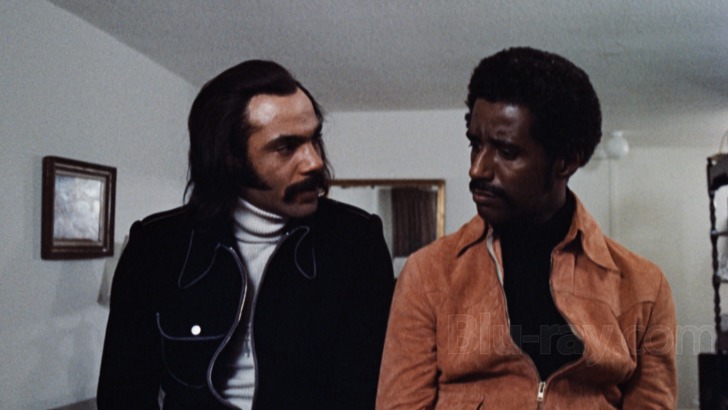
We first encounter Priest (O'Neal) relaxing in bed, wine glass in easy reach, coke spoon around his neck and the nubile body of his adoring white girlfriend, Cynthia (Polly Niles), stretched out beside him (though whether it's Priest or his drugs she adores is unclear). On the surface, Priest has it all, but there's a troubled look on his face, reflecting the discontent of someone who's successfully scaled a steep mountain only to discover that he wants to be somewhere else. The streets remain a perilous place of business, as demonstrated by the two junkies who randomly jump Priest at his next appointment. (They quickly regret their choice of victim.) Above all, Priest wants to be his own man, something he knows he can never be as a black coke dealer from Harlem. As he tells his partner, Eddie (Carl Lee), he wants to get out before he's either killed or forced to kill someone else.
In the great tradition of "one last job" tales, Priest conceives of a massive coke-selling effort that will garner enough cash to let him start over somewhere new. He persuades Eddie to invest everything they've saved together—$300,000, which was a lot in those days—in a thirty-kilogram purchase that they can turn around in four months, amassing a million dollars. Priest will take his share and leave the business to Eddie, who's more than content with the life he's living—though, in Carl Lee's portrayal, you have to wonder whether Eddie would be able to sustain it without Priest's firm hand. (Would he have the stomach to squeeze payment out of a delinquent client like Fat Freddie (Charles McGregor), whose wife Priest threatens to put "out on the street"?)
But to make a purchase of this size, Priest must turn to his old mentor, Scatter (Julius Harris), who is trying to leave the drug trade himself, having survived long enough to acquire a club and restaurant and other Harlem properties that he hopes will support him in a comfortable retirement. As a favor to his old pupil, Scatter arranges to supply him, but the size of the transaction brings them both to the attention of the white overseers who control the city's drug trade. Once these men realize the scale and profitability of the operation that Priest and Eddie have assembled, they have no interest in letting either of them go. Since this organization has plenty of corrupt cops to serve as enforcers, its reach is formidable. (Producer Sig Shore makes a cameo near the end as the operation's top dog.) If anyone thinks that Super Fly's portrait of the NYPD of yesteryear is a racially slanted fairytale, I suggest Googling the "Knapp Commission"—or just watch Serpico. To escape from this behemoth, Priest has to be smarter than anyone expected, and he has to call on some unlikely helpmates, including his devoted girlfriend, Georgia (Sheila Frazier), and a few characters who definitely qualify as unsavory.
All of this restless activity is set to the infectious rhythms of Curtis Mayfield's propulsive score, with its deceptively offhand lyrics that provide a running commentary on Priest, his life and his ambitions. Mayfield and his band appear in the film as an act at Scatter's club, where they perform my personal favorite from the soundtrack, "Pusherman", which is literally a portrait of the flamboyant drug dealer sitting next to the stage. Super Fly's story is basic (the script was only 45 pages long), and its dialogue is sometimes stilted in its simplicity, but Mayfield's music fills every corner of the movie with a pulsating vitality. He and Priest may not be in the same business, but they know the same truths.
Super Fly Blu-ray Movie, Video Quality 
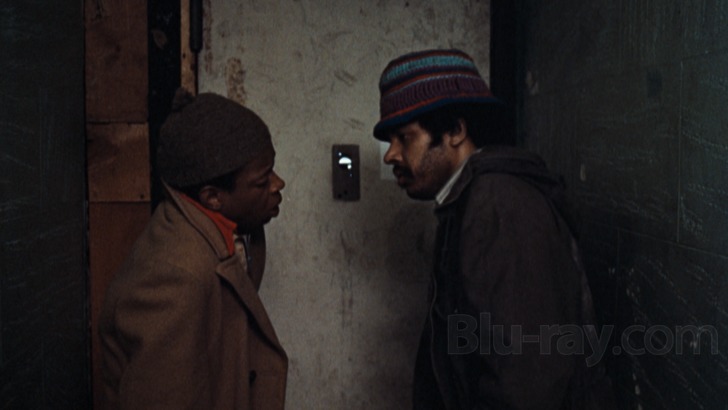
The cinematographer on Super Fly was James Signorelli, who had shot the documentary
Moonwalk One about the Apollo 11 mission and would shortly be devoting most of his
professional life to producing and directing for
Saturday Night Live. As noted in the introduction,
the film was made for less than $100,000, and it looks it—shot on the run, usually with available
light, with less-than-optimal equipment and film stock. Even more than with Shaft, the result is a
gritty, grainy documentary style that captured an evocative portrait of the dangerous, drug-ridden
Harlem of the Seventies and the decaying city around it—the same grim landscape that, a few
years later, would inspire Taxi
Driver's Travis Bickle to arm himself for war.
The source for this 1080p, AVC-encoded Blu-ray from the Warner Archive Collection was a
recently minted interpositive struck from the original camera negative. Warner's MPI facility
scanned the IP at 2K, followed by color-correction and WAC's customarily thorough cleanup to
remove thousands of instances of dirt, scratches and age-related damage. The resulting Blu-ray
image accurately reflects Super Fly's low-budget origins, which means that it's grainy, gritty and
soft overall, but once you look past those qualities, you can see that Parks and his DP managed to
capture an impressively detailed portrait of the mean streets and crumbling buildings that are
Priest's theater of operation. The faded, graying landscape provides an ideal contrast for the
bright colors of its characters' flamboyant wardrobes, especially the men, whose "dress for
success" code is peacock rather than pinstripe. Nighttime blacks are deep and solid, and the
film's grain structure is thick but moves naturally.
I saw Super Fly in its original theatrical release, and while I can't pretend to remember details
from a projected image I experienced nearly fifty years ago, I vividly recall the sense of raw
urban realism that was unlike anything one was used to seeing in studio films. The Blu-ray has that
same feel, and its high video score reflects the accuracy of WAC's presentation, not the beauty of
the result. WAC hasn't tried to sanitize Super Fly for modern eyes, and for that it should be
commended.
Super Fly Blu-ray Movie, Audio Quality 
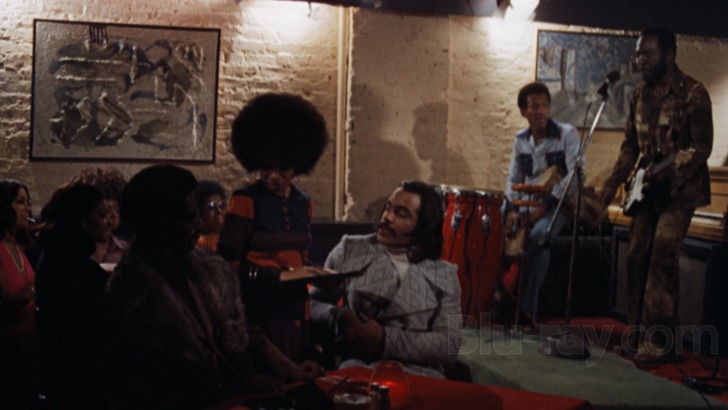
Super Fly's original mono audio has been taken from the original magnetic printmaster, which required minimal cleanup (mostly to remove hiss), and encoded on Blu-ray in lossless DTS-HD MA 2.0. Curtis Mayfield's score comes out the best, because it was created in a studio with the era's best recording technology. The film's dialogue and most of its effects are production sound from the original shoot (with a few obvious instances of ADR), and as a result the fidelity is not the best. Dynamic range is compressed, and the high end can sometimes be shrill, but these limitations are inherent to the source. Nevertheless, the dialogue remains clear, and Mayfield's music expands the sonic presence and elevates the mix, just as it energizes the movie.
Super Fly Blu-ray Movie, Special Features and Extras 
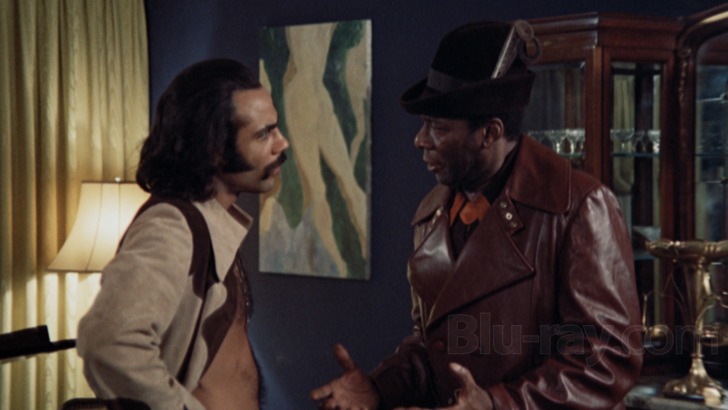
The extras have been ported over from Warner's 2004 DVD of Super Fly. The trailer has been
remastered in 1080p.
- Commentary by Dr. Todd Boyd: Dr. Boyd is a professor at the USC School of Cinematic Arts and the author of The Notorious Ph.D's Guide to the Super Fly 70s, among others. His commentary ranges widely, exploring the film thematically, historically, socially, culturally and even sartorially (the man knows his fashion history). The commentary is a useful reference both for situating the film in its time and for exploring its continuing relevance.
- One Last Deal: A Retrospective (480i; 1.78:1, windowboxed; 24:32): Created for the 2004 DVD, this documentary examines the history and making of Super Fly with all the key surviving participants. (Director Gordon Parks, Jr. had died—at 44—in a plane crash; composer Curtis Mayfield had died of diabetic complications in 1999; and star Ron O'Neal was in the late stages of pancreatic cancer, ultimately succumbing just as the DVD was being released.)
- Ron O'Neal on the Making of Super Fly (480i; 1.33:1; 6:11): This vintage interview dates from the film's original release. After experiencing O'Neal as Priest, it's a shock to hear him discuss his role in the refined and literate tones of a trained theater professional.
- Curtis Mayfield on Super Fly (audio only) (7:05): The composer/performer talks about writing his first movie score and his approach to music in general. The interview is undated, but internal references and the fact that it is limited to audio suggest that it was recorded after the 1990 on-stage accident that left Mayfield paralyzed from the neck down. (He continued composing and recording until his death nine years later.)
- Behind the Threads (480i; 1.78:1, windowboxed; 3:36): Costume designer Nate Adams shows off some of the outfits he assembled for the film and describes how he managed his task with no money.
- Behind the Hog with Les Dunham (480i; 1.78:1, windowboxed; 4:02): The creator of Priest's signature El Dorado provides a tour of his custom auto operation.
- Trailer (1080p; 1.78:1; 2:13): It's a lively trailer from a beat-up source.
Super Fly Blu-ray Movie, Overall Score and Recommendation 
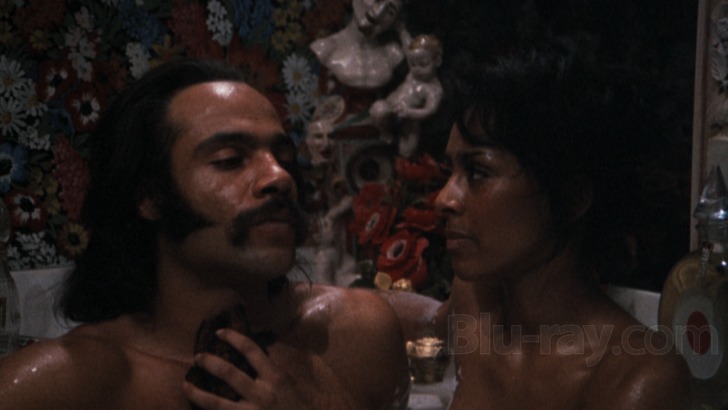
It's fitting (and no doubt intentional) that David Simon and George Pelecanos chose a Curtis
Mayfield song as the opening theme for their HBO series The Deuce, which is set in the same
time period as Super Fly and whose pimps and working girls would be right at home in Priest's
world. Mayfield's "(Don't Worry) If There's a Hell Down Below, We're All Going to Go" could
just as easily have been the theme for Super Fly and its hero's struggle to claw his way out of the
drug trade and find a second chance. The Deuce has the polish of a contemporary digital
production with an HBO budget, but it had to re-create the Seventies with
detailed research, meticulous production and costume design, and extensive CGI assistance.
Super Fly is the real thing, and WAC has brought it to Blu-ray with its gritty texture fully intact.
Highly recommended (but grain-o-phobes should beware).
Similar titles
Similar titles you might also like

Boxcar Bertha
1972

Cut Throat City
2020

The Peace Killers
1971

Friday Foster
1975

McQ
1974

Sweeney!
1977

Disco Godfather
1979

Savage!
Black Valor
1973

The Black Gestapo
Black Enforcers / Ghetto Warriors
1975

The Lost Honor of Katharina Blum
Die verlorene Ehre der Katharina Blum
1975

Dheepan
2015

The Tough Ones
Rome Armed to the Teeth / Roma a Mano Armata
1976

Proud Mary
2018

Baadasssss!
How to Get the Man's Foot Outta Your Ass | included with "Melvin Van Peebles" box set
2003

Coffy
1973

Black Caesar
1973

The Black Windmill
Special Edition
1974

The New Centurions
Limited Edition to 3000
1972

Sweet Sweetback's Baadasssss Song
1971

The Harder They Come
Collector's Edition
1972
